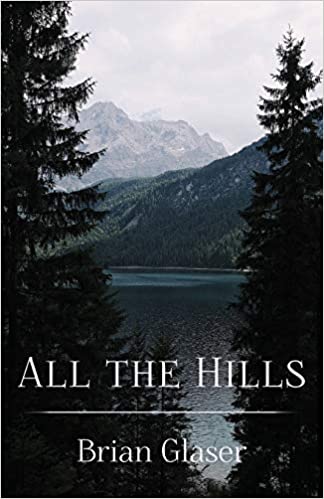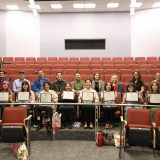Faculty Books: All the Hills by Dr. Brian Glaser
October 2, 2020
 2020 has brought its challenges as we deal with staying in our homes, staring through computer cameras, and watching as the world passes by us. With so much time for realization and reflection, there isn’t a better time to pick up a book of poetry.
2020 has brought its challenges as we deal with staying in our homes, staring through computer cameras, and watching as the world passes by us. With so much time for realization and reflection, there isn’t a better time to pick up a book of poetry.
Look no further, Dr. Brian Glaser, associate professor for the Department of English in Wilkinson College, has just the book that you need with his new release, All The Hills. The stanzas of this book definitely serve as a thinking space for those who have the time. Glaser has brings his gathered knowledge and wisdom to the pages as he takes a glance at the world he has grown to both love and dislike. With discussions on many of the social issues that we now face, from Native American displacement to morality, Glaser doesn’t hesitate to have moments of honesty with himself and his audience.
The Voice of Wilkinson sat down with Glaser to have a brief discussion with him about All the Hills.
Voice of Wilkinson: Could you please introduce yourself to your target audience?
Brian Glaser: The audience I write for is everybody who reads poems in English, or who would like to try. I have been teaching and writing poetry for many years. It’s a spiritual practice for me most of all. I feel very fortunate to be a teacher at Chapman. I’ve never been told not to try something as a teacher—every interest of mine has been encouraged by my department and by the university. And I’ve learned so much from my colleagues and my students. I think I always will, for as long as I’m teaching.
VoW: Could you please introduce the concept of your poetry book and give us a little background on how the story came about (if you would call it a story)?
BG: Like many people, I was confronted in the last few years with how profoundly flawed America is as a moral community. I had known this for a long time, but it became impossible not to dwell on after the election. And so I began to think a lot about how to imagine and recognize other kinds of communities for poems in English. And the city, the region, the desert biome—embracing these communities became themes for me. If there is a concept that envelops the book, it’s in this statement: Hope is a question.
VoW: How long do you say it took you to finish this piece?
BG: I began the book on April 23, 2018. I was inspired to write the first poem, “Pueblo Sin Fronteras,” by a gathering of musicians outside of the Theo Lacy detention center in Orange who were pausing and making art on their caravan to the border. The last sequence of poems, “Saltwater Wetlands,” about the endangered Bolsa Chica wetlands, I wrote over three days in January 2019.
VoW: What would you like the audience to get from this piece?
BG: Maybe to credit this passage, from “Bradstreet Prayer-Sail,” which I wrote as I was thinking about the question of how to keep your integrity while living in a corrupt social order:
all the salt in the oceans
and still this
freshwater rivulet.
It can be irresponsible to idealize nature since it is under such strain, but this speaks of my sincere belief in what we can learn from the natural world. And I do make journeys to rivulets like this—this summer it was with my family to McGee Creek in the Sierras.
VoW: You have a lot of different topics that you discuss in this piece; and although every topic is essential to how we observe our society, there may have been specific topics that touched you the most, especially when having to complete a stanza. Can you rank the topics, in terms of the impact they had on your views of the world now and discuss why they were so impactful to you?
BG: My view of the world is that it is a place of possibility. I used the phrase “the unborn world” in a poem in this book. That’s what calls me. A hope for justice.
VoW: I really appreciate your discussion on Native American Displacement. We live in a time where voices of color, colonization, and forced assimilation are demanding to be heard , but why was this topic so important to discuss?
BG: The displacement of indigenous people in the US is present in a number of poems in the book. It is a personal matter for me. I never learned as a child or young man from my family that a granduncle of mine, Daniel Brodhead, was the leader of attacks—massacres may be a controversial word, but it is apt—against Seneca people in the Revolutionary War. It’s painfully close to what was done to indigenous people by the military in Guatemala, where my wife grew up, in the civil war there.
To paraphrase William Faulkner, the past isn’t dead—it isn’t even the past.
VoW: What is your favorite part of the book, and why?
BG: I think probably the poem addressed to my son for his tenth birthday. Poetry is one of the better ways I express love.
VoW: What do you think your next project will discuss?
BG: I have a book forthcoming from Shanti Arts within the next few months, Contradictions, which has spirituality as its theme, especially Daoism, which I have been studying seriously for about two years now. And the manuscript to follow that is called Difficult Joy. That I just finished.

